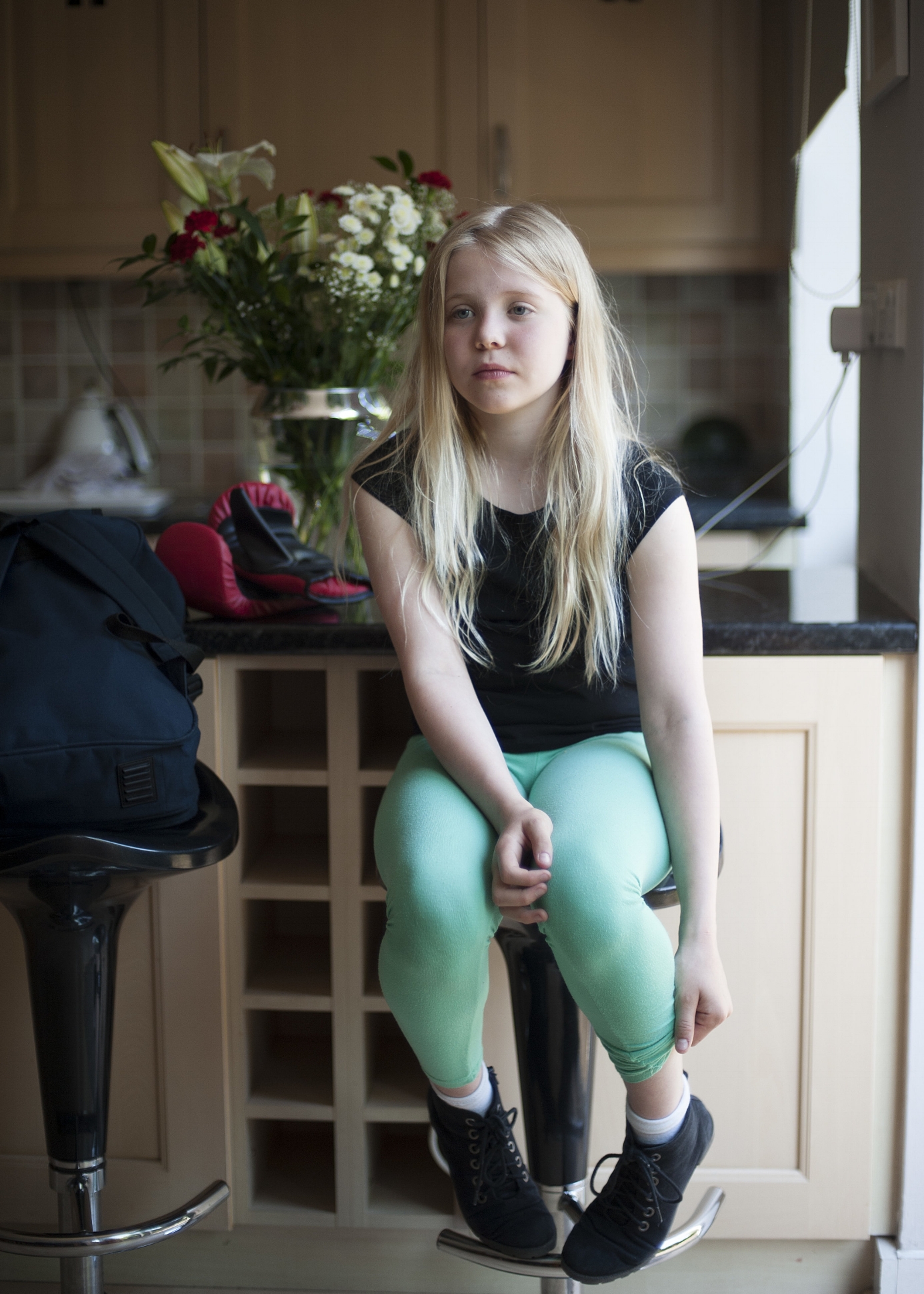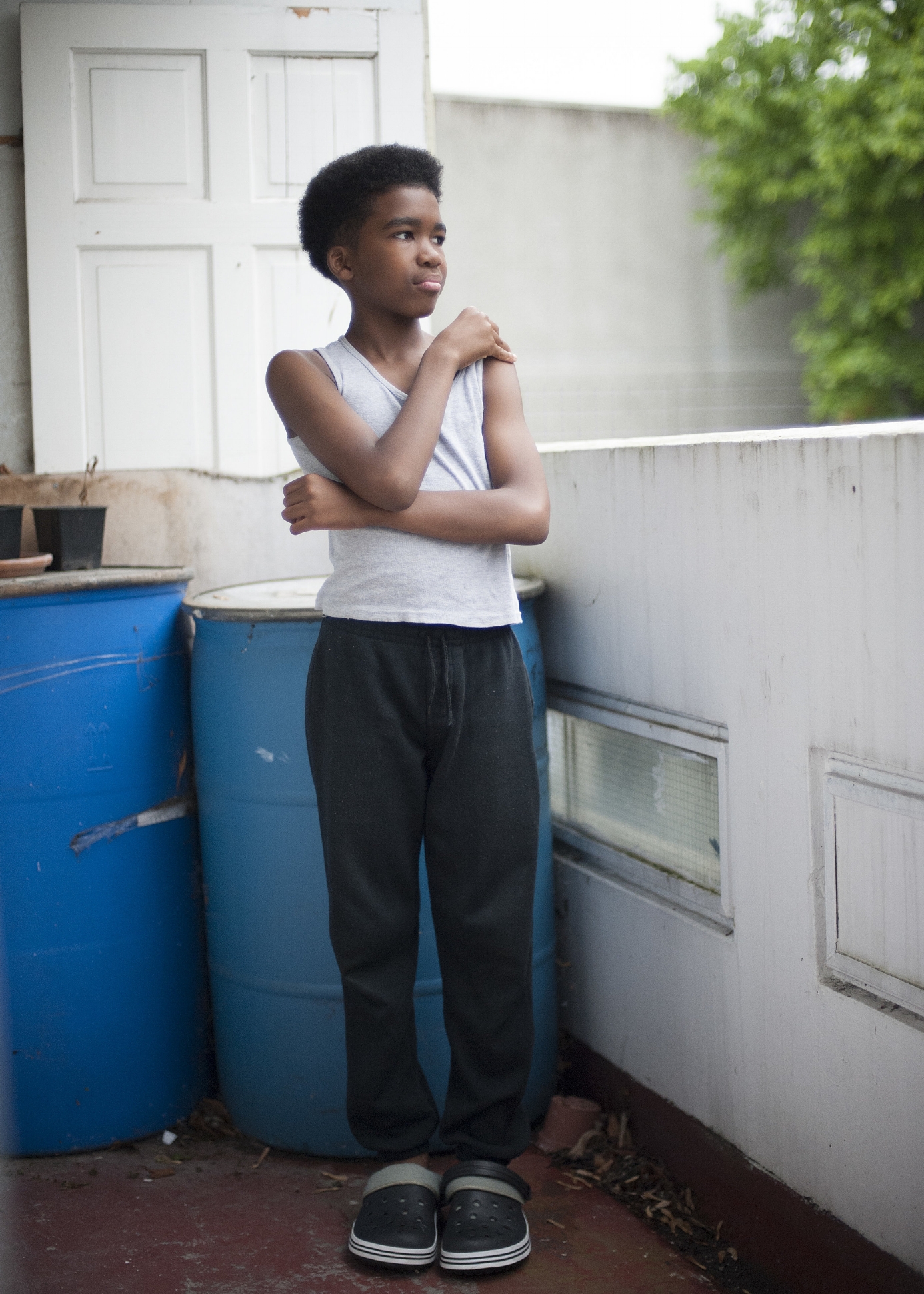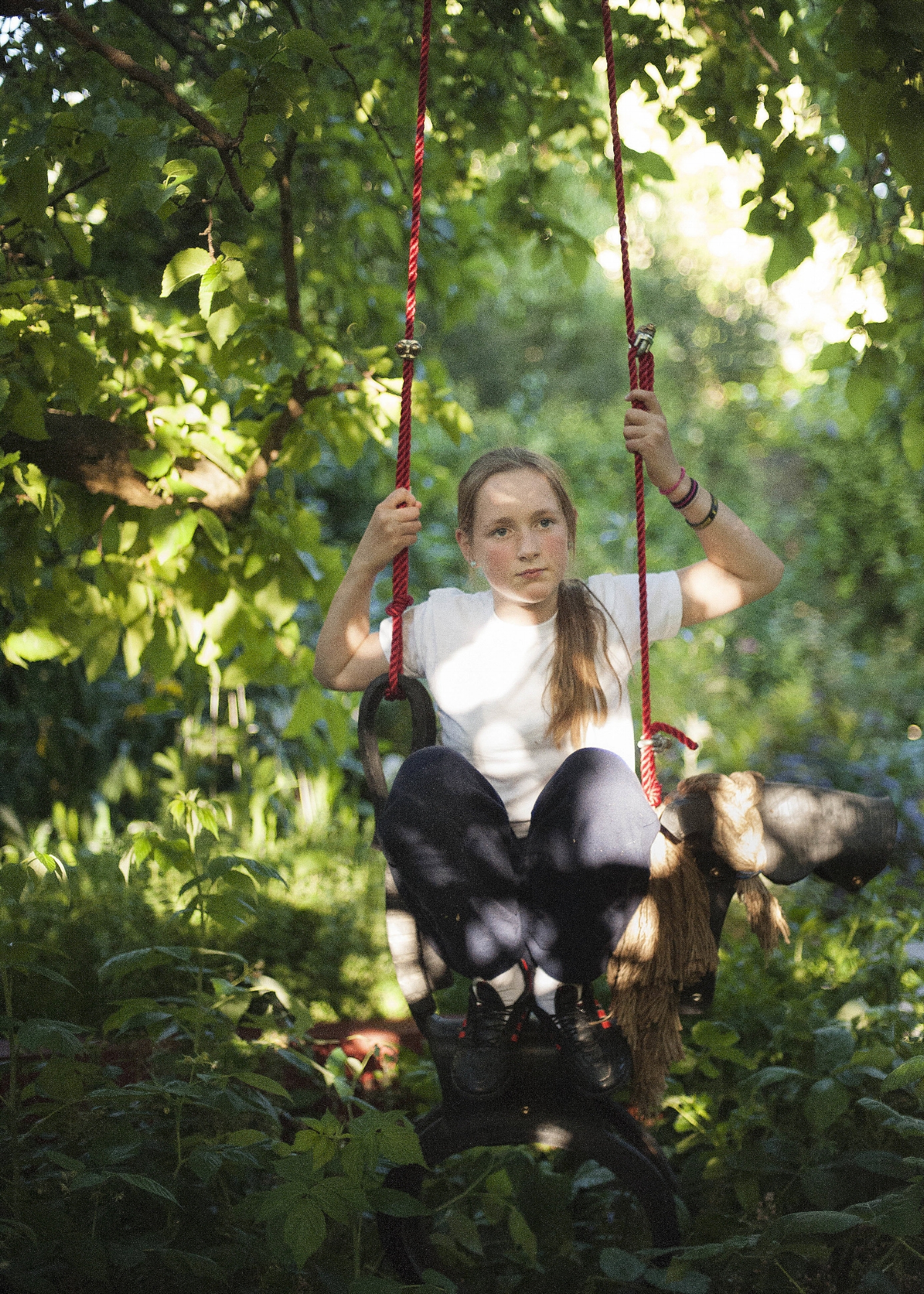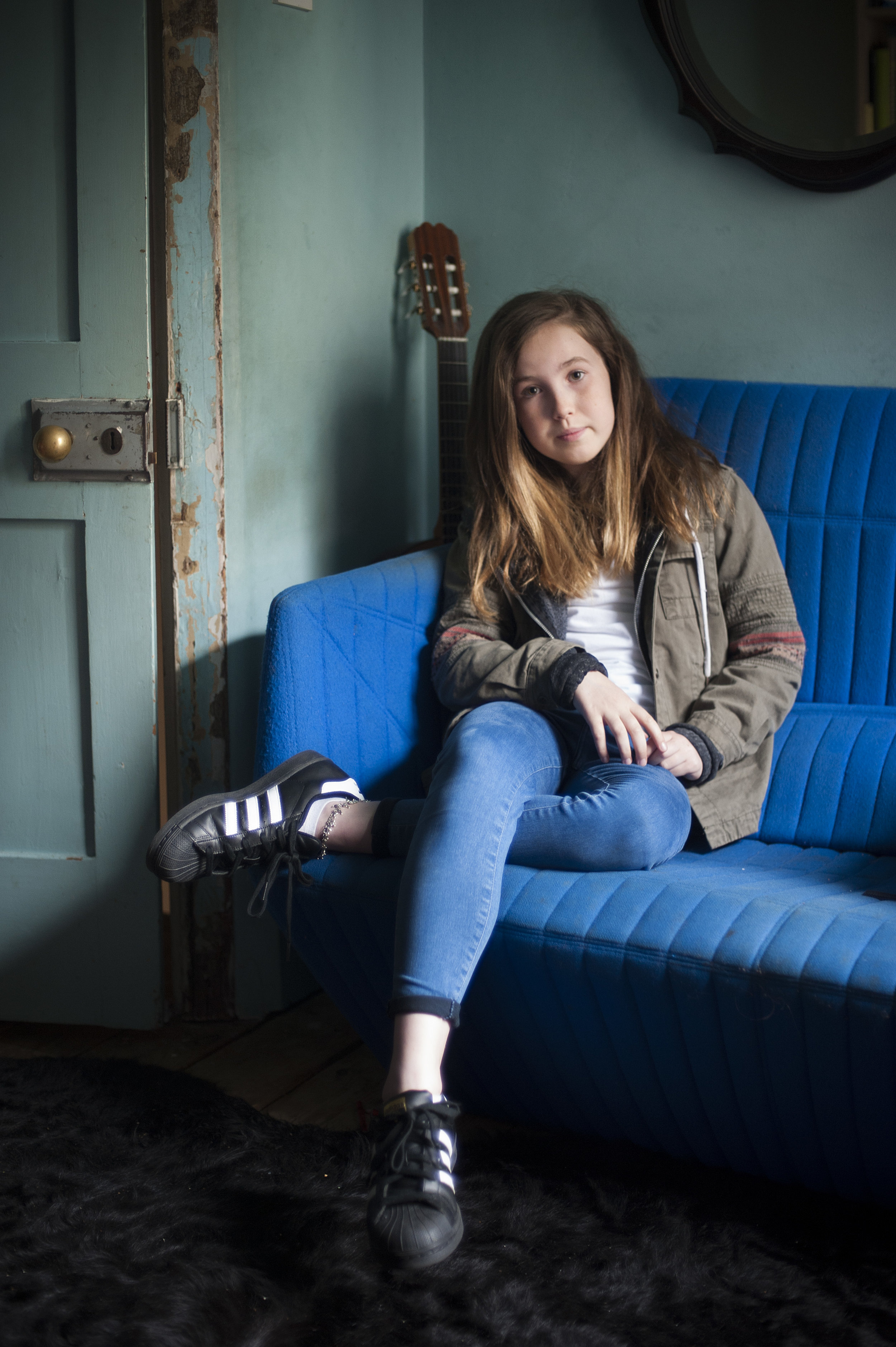Rachel Molina on "Seen But Not Heard", Her Look Into The Transition from Childhood to Adolescence
Miah H: “I would like to be a singer and dancer when I’m older. I would also like to learn a new language. I’m a bit nervous and I think I will be a bit confused because on my first day. My Mum will have to leave me there and I will have to get to know the school and all the teachers.”
"If someone had asked me those questions [at that age], I don’t know if I would have answered with such maturity. So I think what I learned from them is kind of lots of things. I think primarily, I learnt that their hope for how it was going to be for them tended to override any worries."
By Cailin Loesch
Born in London in 1980, Rachel Molina was educated at a Steiner school and at the internationally renowned BRIT school where she majored in theatre production. However, an earlier introduction to photography had sown the seeds of a greater passion, and she moved on to study photojournalism at Tower Hamlets College before furthering her photographic studies at the highly acclaimed London College of Printing (now the LCC). Her recent project, “Seen But Not Heard,” features profiles of students entering the period of transition between primary and secondary school, speaking on their feelings and fears about life changes surrounding both their personal life and friendships and their education. I spoke with Rachel on the phone about the project, which was recently featured at the V&A Museum of Childhood in London. Listen in...
Madeline: “When I was at primary school I had a teacher I didn’t like and I know at secondary school I am not going to like all the teachers, but I know that the teachers are not there to annoy you, they are there just to teach.”
Cailin Loesch: You wrote in your portfolio for this project, “Seen But Not Heard,” that it is actually part of conventional wisdom that children should, as the title states, be “seen but not heard”. What does that mean to you? And why, according to your research for the project, do some people hold this belief?
Rachel Molina: I think probably with British culture, there’s still a kind of—I think there’s an underlying expectation every now and then that children should be seen and not heard. I do believe that. Like when you go to the Continent, to Europe, children seem to be much noisier, and it’s much more accepted if they cry; and here, even though we like to think we’re not like this, there is definitely the old Victorian-ness in us a little bit. I think when children, especially around 11, are changing schools from primary to secondary education like they do here, I think there’s kind of this expectation that they should go through this transition very, very easily, and for it to not really bother them, when actually when I was doing this project what I came across was this really emotional turmoil that a lot of these kids felt. They had a lot of fear, and a lot of excitement—there was a lot of positivity—but there was a great deal of nervousness, ‘cause it’s the unknown. They’re going from being the big kids on the playground, to the little ones all over again, you know what I mean? That’s a big thing! It’s kind of like getting demoted at work, going from a managerial role back down to administration. It’s similar. And I think possibly with British culture, sometimes we don’t give children enough credit. You know, maybe we don’t talk to them enough, and we kind of just expect them to get on with it. It’s that British reserve, you know.
Ahmed: “I’m going to my new school with only three friends. It took me ages (at Primary school) to find five friends but now I just want to stay with them. I don’t want to stick to them all the time but I just want to be with them whenever they need me. One thing I have learnt is to keep your friends close. I have learnt to treat others how you want to be treated.”
CL: You were just talking about how what you found was kind of a mix between anxiety and excitement, but when you first set out to do this project, did you have an expectation as to where the stories would lean? Was your expectation more that you’d find these students in a state of excitement, or a state of anxiety?
RM: Yeah, that’s a really good question because actually, I thought that a lot of the children would spend a lot of their time talking about their friendships, and how that was going to be a big thing for them. But actually what I came across with lots of kids was how they were really eager to learn new subjects. That was a really continual thing. They were all really eager to kind of learn advanced levels of what they had been learning in science, and just learning whole new subjects. I thought that was really interesting. They were thinking about their education; it wasn’t just about leaving friends or their friends going to other schools, it was also about their education. That did surprise me, because I was expecting more of, “I’m gonna miss my friends!” And there was, of course, but they all mentioned their subjects.
Joshua: “I’ve seen some of my friends being bullied before so I know how to avoid and handle it. I’m looking forward to lessons and trips but I’m least looking forward to science. I don’t know what I want to do when I leave school but I like the idea of being in an office. I just don’t want to be working in an office for the rest of my life.”
CL: Where did you meet the children that you profiled, and how did you choose which of them you wanted to speak to?
RM: Basically, the inspiration for the project came from my son, who was in the same year as these children. He’s not in the project, because I felt if I had put him in, as a photographer, and as a mum, it would become about him, you know what I mean? And I didn’t want it to be about him. I wanted it to be about the collective experience that most children in this country go through at that age. So it kind of started, really, on a real grassroots level, where I approached mums that I knew whose children were in the same year as my son, and then good old social media helped. Local groups to where I lived, too—I just kind of put a shout out that I was doing the project, and I think that people were mildly reluctant; they weren’t quite sure what it was. But then they got in touch and I’d tell them my idea, and that I’m going to be really sensitive in my approach, and really gentle. I’m obviously not going to make them feel uncomfortable. And people then kind of really liked the idea. Actually, when I had the exhibition at the V&A Museum of Childhood, so many parents came up to me and said that for them as a family, having this portrait and this experience of being a part of this project was such a pinnacle point in their relationship with their child and their child’s development. And that was really nice—I think for the parent, and the children who participated, it turned into something bigger for them, as well. All the children that I was able to photograph are in the project, so I found all of them interesting. I wasn’t setting out to find certain children. I think the only condition—and I use that lightly—was that I did want them to be in state school, and in what we would call public school, or government school. Because then they’d all be moving on to new schools, whereas in private school, they stay in the same school. So it wouldn’t have been the same experience for them.
Holly: "If I didn’t have any friends coming with me I think I would feel really nervous. I don’t often like it when I go somewhere and there is no one there that I know. My sister will be there but only for one year and then I will be on my own. I will have to make friends at my secondary school because what if the friends that are coming with me don’t’ get into the same form as me. Year 6 is like the best year and I just want to go over and over it again. I sometimes feel happy because we are growing up."
CL: What kinds of questions did you ask each to spark the kinds of conversation that you had, or that you wanted to have? A lot of them really opened up, and were talking very deeply about how they felt about what they were experiencing.
RM: I kind of had to approach every child slightly differently. Some kids were really gregarious, and spoke at length. I mean, I’ve got some recordings of children speaking for half an hour about how they feel, and they’re so articulate, and it’s incredible, actually. And some, I could tell were shy. So I think with all of them I was gently sort of asking very basic questions [starting with] whether they were moving to a school with their friends, and that would kind of unravel what their experience was actually like. Because if they said no—I mean, you saw in the project, some of them were going to school completely on their own—then that would change the way the conversation went, and it would be more about how they were feeling about that, and whether it worried them, and all that kind of stuff. Whereas if it had been that they’re all going together, it was kind of more like, “how do you feel? Who have you got going with you?” That kind of dominated which way the conversation went. But I really tried not to lead them, because I didn’t want to put my experience or my son’s experience onto them to get the answers, you know what I mean? It was just led by them, really.
Adam: "The hardest thing will be not to forget things really. I’m worried about leaving pencils and pens behind. You get given a diary so I should remember. Thinking about my first day at school I will probably be a bit nervous but the teachers will be nice to use because it’s our first day, so if you forget something it’s not like they are going to give you detention. It’s a massive difference from being top of primary school to then going right down to the bottom again. It’s quite odd. When I am older I want to go to university and I’d quite like to study engineering. I’d like to be a pilot."
CL: I love the part of the portfolio where you write that the unique feeling that come with the transition into early adolescence is something that we as adults tend to forget. What memories from your own transition into secondary school did this project bring back for you?
RM: I actually changed schools when I was ten, so it was a similar age. From what I remember, my overall feeling was excitement. I think that sometimes, when you’re young, you don’t necessarily feel anxiety the way an adult does. But then, other things can make that anxiety come about. So if you are worried about making friends, or if it is the complete unknown. But for me, I think it was okay. I think it was more as a parent, watching my son go through it, actually, that kind of made me think, “wow, this is actually a huge thing that every child goes through, that all these children in one year group around the country go through, collectively, every year.” It’s kind of a joint experience with the child and the parent. Because parents have their own anxiety about their children changing schools, and I think that to me is the key. That kind of feeling. I think that was more where I was coming from with this. Less of my own experience, and more of how I was feeling as a parent, watching my child feel those feelings.
Unity: "I’m feeling OK about starting secondary school but I am worried about bullies; I’m not sure there will be too many of those. There are lots of groups of girls in our school and I have learnt how to go around all of them without hurting anyone’s feelings. This will definitely help me in my new school. There are a couple of things I would like to do when I’m older because I just can’t decide on one; I’d like to be a dancer, an actress, an artist or a hairdresser but if I had to pick one now it would be an actress because I like drama."
CL: Last question for you, Rachel. Based on some of the quotes I read, you seem to have been able to meet with some especially mature, and as you mentioned, articulate, kids. What did you learn from them and from your experience doing this project?
RM: Wow, they were really articulate [laughs]. And I have to say, that is one thing that I remember thinking, I don’t know if I would have been that articulate at that age.
CL: Yeah, right?? [laughs]
Tom: "My new school was my first choice but none of my friends are going there. I don’t feel left out. My favourite subjects at primary school are maths and PE. I am going to enjoy the sports at secondary school the most because I got a scholarship in it and that’s what I’m looking forward to. The teachers will be so strict. I’m also going to have to tuck my shirt in and make sure I don’t leave my jumper behind. When I am older I’d like to be a game designer, a scientist or an architect."
RM: If someone had asked me those questions, I don’t know if I would have answered with such maturity. So I think what I learned from them is kind of lots of things. I think primarily, I learnt that their hope for how it was going to be for them tended to override any worries. All of them were very positive. There’s a couple of them that stand out to me, where they had clearly had a hard time. There’s one particular boy, Shay, who had a hard time at school with his learning and with his friendship group. He was really into art and design and textiles, and I remember after I met him, as I was leaving after photographing him, just hoping that when he got into secondary school, a teacher was going to look after him and make sure he excelled at the things he loved. That really stayed with me; I go back to the idea of their want to learn. That’s really it. They actually do really want to learn. They want it to be exciting, and they are wanting these new experiences.
Shay: "I don’t really have a best friend at the school I am at now. My friends can be very annoying sometimes. They text me and ask me to meet with them to play and then they don’t turn up. I have learnt to ignore them now. I’m most looking forward to getting to learn more subjects instead of just maths, literacy, science, ICT and PE. They are the only subjects we do at school now. I’m looking forward to textiles and design. I like to design stuff. Sometimes I just design stuff in my head. My new school is on three levels and I’m worried that I might not find my way to the right floor. You only have four minutes to get to each class so you might be on the bottom level and you next class could be right at the top. When I’m older I would like to do textiles design and music. I have my own drum kit with cymbals and it has a small electric piano on it. I like to play around creating different music."
Alana: "I am going to secondary school with two of my friends. My sisters are also there and I’ve heard stories about the teachers. I won’t be seeing my friends very much as I’m probably not going to be in the same form as them. Everybody has flaws, even the ‘cool’ people aren’t perfect. There are a few children in my class that I thought ‘wow’ I could never be friends with them as I’m not one of those cool girls, and then I saw their flaws. I saw what I was better at and what I was worse at and then I became friends with most of them. For a long time I wanted to be a police dog handler but I’m now hoping to be a zoo veterinarian which is paid quite a lot. I want to keep up with my football and I will never give up horse riding – never. The conversations will change so I can’t always think about the old times."
Oliver: "The secondary school I’m going to was not my first choice and I was slightly disappointed. My best friends are not coming with me. I will make new friends and I feel alright about it. I have been really happy at primary school. I am most looking forward to science because primary school science is just rubbish; we will get to do proper experiments not stupid things. I am worried about bullying but if I ever get hurt I never make a fuss or cry. I do football and swimming outside of school and I will definitely carry these on. When I’m older I would like to be a video game reviewer and get paid for playing video games. I’m kind of addicted to playing video games but my Mum doesn’t allow me to play them on week days."
Mabel: "I’m going to my new secondary school by myself. Quite a few of my friends are all going to different schools by themselves. I guess I’m a little worried about making friends. I can be confident when I want to be but I will probably be a bit shy because that’s just me. I made friends with a couple of people when I went to my induction day, so I will try and spot them. When I was younger I used to be a perfectionist and I would get so upset and in such a state about things. I used to try not to do things because I was scared that I was not going to do it well. I’ve learnt that you never just have once chance to do it. I wish I could start secondary school now. We have had lots of conversations about how we are feeling but I think the whole message is not to worry."



















